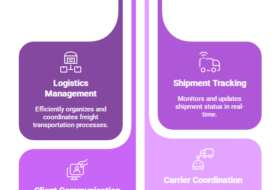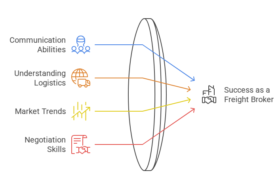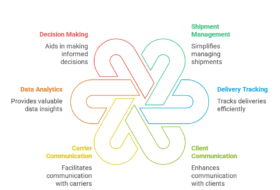Table of Contents
- Introduction
- Benefits of Running a Freight Brokerage Business from Home
- Setting Up Your Home Office
- Essential Licenses and Certifications
- Building Relationships with Shippers and Carriers
- Leveraging Technology for Success
- Conclusion
Introduction
The freight industry plays a critical role in global trade, and as the demand for logistics services continues to grow, there’s never been a better time to enter the field. Starting a freight brokerage business from home offers aspiring entrepreneurs an opportunity to build a profitable career while enjoying the flexibility of remote work. Whether you’re looking to start fresh or leverage prior experience in logistics, a home-based freight brokerage is a smart and scalable business model. This guide will walk you through the six essential steps to establish and run your freight brokerage business from home. From setting up your workspace to building a strong network of shippers and carriers, we’ll cover everything you need to know to succeed.
Benefits of Running a Freight Brokerage Business from Home
Operating your freight brokerage business from home offers numerous advantages:
- Lower Overhead Costs: You save on office rent, utilities, and commuting expenses, allowing you to invest more in growing your business.
- Flexibility: Work at your own pace and schedule, creating an ideal work-life balance.
- Focus: A home environment minimizes distractions from office dynamics, enabling you to concentrate on your tasks.
- Scalability: Starting small from home allows you to gradually scale operations as your business grows.
Additionally, the increasing popularity of remote work has normalized home-based businesses, giving you access to the same tools and resources as larger companies.
Setting Up Your Home Office
A productive workspace is essential for running a professional freight brokerage. Here’s what you need:
- Dedicated Space: Choose a quiet area in your home where you can focus without distractions.
- Reliable Technology: Invest in a high-performance computer, a fast and stable internet connection, and a multi-line phone system.
- Freight Management Software: Tools like load boards and transportation management systems (TMS) streamline your operations.
- Professional Setup: Ensure your workspace is organized and equipped with essential office supplies like printers, filing cabinets, and ergonomic furniture.
A well-structured home office not only boosts productivity but also helps you project a professional image to clients and partners.
Essential Licenses and Certifications
To operate legally as a freight broker, you’ll need to meet specific regulatory requirements:
- FMCSA Operating Authority: This is your official license to operate as a broker, issued by the Federal Motor Carrier Safety Administration (FMCSA).
- Surety Bond: A $75,000 surety bond ensures financial accountability, protecting carriers and clients in case of disputes.
- Business Registration: Register your business with local and state authorities to comply with tax and regulatory requirements.
- Freight Broker Training: Although not mandatory, completing a training program provides invaluable industry knowledge and skills.
Online resources, such as Freight Brokers Course, can guide you through these steps effectively.
Building Relationships with Shippers and Carriers
The heart of any successful freight brokerage is its network of shippers and carriers. Building trust and fostering strong relationships are essential for securing contracts and ensuring repeat business:
- Start with Networking: Attend industry events, join freight-focused online communities, and use platforms like LinkedIn to connect with potential clients.
- Communicate Effectively: Provide clear and consistent updates to both shippers and carriers to maintain transparency.
- Deliver Reliable Service: Meeting deadlines and solving issues promptly helps establish your reputation as a trustworthy broker.
Your ability to manage these relationships can set you apart from competitors and pave the way for long-term success.
Leveraging Technology for Success
Technology is a game-changer in the freight industry. Here are the tools you need:
- Load Boards: Use platforms like DAT or FindFreightLoads to match loads with available carriers.
- Freight Management Software: Automate tasks such as dispatching, invoicing, and tracking shipments.
- Communication Tools: Video conferencing and messaging apps like Zoom or Slack improve collaboration with clients and team members.
- Tracking Systems: GPS tracking helps you monitor shipments in real-time, enhancing customer satisfaction.
Embracing technology not only streamlines your operations but also helps you stay competitive in a fast-paced industry.
Conclusion
Starting a freight brokerage business from home is an exciting opportunity to enter a thriving industry with minimal upfront costs. With a dedicated home office, the right tools, and a focus on building strong relationships, you can create a successful business that offers financial freedom and flexibility. By securing the necessary licenses, leveraging technology, and continuously expanding your network, you’ll position yourself for long-term growth and success. Partnering with training providers like Freight Brokers Course ensures you have the knowledge and support to hit the ground running.
Take the first step toward building your dream business today, and turn your home into the headquarters of a profitable freight brokerage operation.
Growth + Change = Opportunity! How are you going to capitalize on the opportunity as a freight broker, agent, dispatcher or box truck carrier?
Enroll in a course today and get a Shippers List for free! Use Code: freeship








